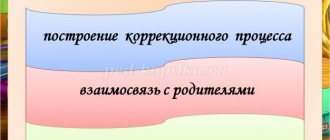Interactive forms of working with teachers
Interactive forms of working with teachers.
Tell me and I will forget;
Show me and I will remember;
Let me do it and I will understand.
(Chinese proverb)
Leaders of methodological associations often face the question: how can we ensure that every teacher becomes an active, interested participant in the work of various forms of methodological associations? How to get rid of the passivity of individual teachers? How to transfer them from reproductive activity to research? Towards the formation of the ability to reflect in the process of learning new things and mastering familiar material?
Enhancing the creative activity of teachers is possible through non-traditional, interactive methods and forms of working with teachers.
Many major methodological innovations are associated with the use of interactive teaching methods. It is necessary to understand the concept itself.
The word “interactive” came to us from the English language from the word “interact”, where “inter” is “mutual”, “act” is to act
.
“I hear and forget, I see and understand, I do and remember ,”
says a Chinese proverb. The methodology of participation and interaction fully involves in the educational process.
Interactive means the ability to interact or is in a mode of conversation, dialogue with something (for example, a computer) or someone (for example, a person).
From this we can conclude that interactive learning is, first of all, dialogue learning, during which the interaction between the head of the educational organization and the teacher-participant of the educational organization takes place.
What is the main purpose of “interactive”?
One of these goals is to create comfortable learning conditions, such that the teacher (student) feels successful, intellectually competent, which makes the entire learning process productive and effective.
What is the essence of interactive learning?
The interaction process is organized in such a way that:
— almost all participants are involved in the process of cognition and discussion;
— colleagues have the opportunity to understand and reflect on what they know, understand, and think about;
— each participant makes his own special individual contribution, has the opportunity to exchange knowledge, his own ideas, methods of activity, and hear different opinions of colleagues;
- this process takes place in an atmosphere of goodwill and mutual support, which makes it possible to gain not only new knowledge on the problem under discussion, but also develops the pedagogical activity itself.
Interactive activity involves the organization and development of dialogue communication, which leads to interaction, mutual understanding, joint decision and acceptance of the most common, but significant tasks for each participant. Interactive learning eliminates the dominance of either one speaker or one opinion.
A modern approach to methodological work in preschool educational institutions in the context of the implementation of the Federal State Educational Standard
This article presents a teacher’s view of the methodological approach in a preschool educational institution in the context of the implementation of the Federal State Educational Standard.
Key words: Federal State Educational Standard, preschool educational institution, standard, pedagogical competence.
Up the pedagogical ladder, modern education is gaining momentum with rapid steps. Studying the Federal Law of December 29, 2012 No. 273-FZ “On Education in the Russian Federation” [1], we can see that preschool education in Russia has the status of the first independent level of the educational system. Based on this, we can safely talk about the relevance of standardization today.
Preschool education today poses a number of challenges that need to be solved in the context of modern requirements. All tasks are connected by a single goal - creating conditions for a “strong foundation” for the development and implementation of pedagogical ideas and views in the preschool period, in accordance with the social and economic needs of the country, as well as the demands of modern society.
Global changes are taking place not only in the country’s legislative system, but also in modern pedagogical society. Today, high methodological requirements are imposed on the work of preschool teachers, in order to improve the efficiency of the quality of educational services during preschool childhood.
The professional competence of a teacher takes first place in the implementation of the tasks of the Federal State Educational Standard for Educational Education, therefore, every teacher simply needs to have a pedagogical base of knowledge, skills and possess all the competencies that are prescribed in the standard. The teacher, focusing on the standard, must first of all be focused on the pupil himself, regardless of the characteristics of his mental and physical development. All pedagogical activity must have directions of pedagogical work only for the benefit and quality of education of the child himself [1, p.34].
On the part of the preschool educational institution management, there is a need to draw up a clear algorithm for conducting methodological work. After all, competent pedagogical activity will in the future produce only positive results from all the work of a preschool educational organization. Each methodological event must be planned with the introduction of clear conceptual ideas that help improve the quality level of the management system in the preschool educational institution.
All aspects of methodological support must be focused not only on the result itself, but also on all participants in the pedagogical process.
Modeling of methodological support in preschool educational institutions must be built in a scientific, creative and modern way, where the creative potential of each teacher will be revealed. It is necessary to focus the entire teaching staff on professional growth.
But, if we look deeper into this problem, we can see that not all teachers strive to improve their educational level. Their teaching experience remains on the line of Soviet professional training. These teachers try to maintain the same content of educational activities in a preschool organization. Modern innovations become for them only an additional part of emotional overload. But one of the main points of the standard is the competence capabilities of a modern teacher.
Considering the concept of “professional competence of a teacher.” We can determine that this is a multifactorial phenomenon, consisting of the theoretical and practical knowledge of the teacher, as well as ways of applying them in specific pedagogical situations [2, p.45].
Thus, the professional competence of a preschool teacher depends on various personal qualities, the main source of which is training and subjective experience. Professional competence is characterized by a constant desire for improvement.
The psychological basis of competence is the desire to constantly improve one’s skills and raise one’s professional level. A teacher who does not develop will never show the true face of a creative personality! That is why increasing the competence and professionalism of the teacher is a necessary condition for improving the quality of education, both the pedagogical process and the overall quality of preschool education.
Based on these competencies, it is necessary to organize methodological work in a preschool educational institution at a modern level.
Methodological work is a holistic system of interrelated actions, based on scientific knowledge and advanced pedagogical and managerial experience, aimed at improving the quality and efficiency of the educational process by ensuring the professional growth of teachers and the development of their creative potential. The purpose of methodological work in a preschool educational institution in the context of the implementation of national educational standards for educational institutions can be formulated as follows: increasing the professional competence of teachers in the implementation of national educational standards by creating a system of continuous professional development of each teacher.
Based on this, we can emphasize the main tasks of the methodological service at the new stage [3, p.78]:
- Improving legal support for the methodological service of preschool educational institutions.
- To promote the creation and development of a developmental educational environment in preschool education, which will allow the achievements of a new quality of education to be realized.
- Improving the professional competence of teachers.
- Ensure the introduction of innovations in preschool educational institutions.
- Encourage positive teaching experiences in preschool settings at all levels.
- To increase the effectiveness of methodological work with teachers in order to increase their professionalism and creative activity.
Thus, from all of the above, the main thing can be highlighted that all methodological work in a preschool educational institution simply must be built on the current structure of the creative potential of each participant in the pedagogical process, based on professional and personal growth, as well as on positive stimulation of the results of the pedagogical activity of each teacher. After all, the modern approach to methodological activities will only improve the quality of educational services provided by preschool educational institutions.
Literature:
- Federal Law “On Education in the Russian Federation” dated December 29, 2012 No. 273-FZ (latest edition).
- Belaya, K. Yu. Methodological work in preschool educational institutions: Analysis, planning, forms and methods [Text]/K. Yu. Belaya - M.: Sphere shopping center, 2015.–324 p.
- Troyan, A. N. Management of preschool education [Text]/A. N. Troyan. – M. 2022. – 264 p.
- Falyushina, L.I. Quality management of the educational process in preschool educational institutions [Text]/L. I. Falyushina. - M.: ARKTI, 2016. - 428 p.


